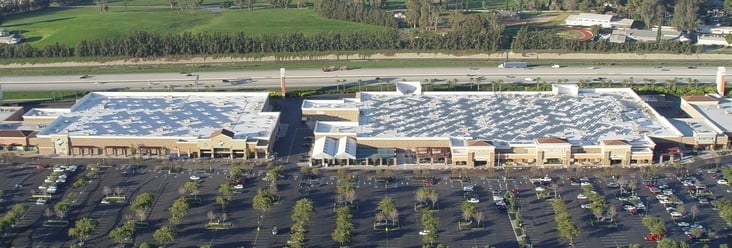
A solar array on the roof of a Southern California Sam's Club.
Advanced energy is becoming a part of our everyday lives. Whether we know it or not, every time we turn on the lights, drive on a road, or go shopping we are interacting with technologies that are helping the world run on energy that is secure, clean, and affordable. This week the news was full of just those stories: From Portland and Chicago we have stories of cities choosing advanced energy, and from Ford and Walmart stories of advanced energy integrating into our everyday lives.
This week, Chicago announced that its more than 900 municipal buildings will be powered by renewable energy by 2025. Next year, the city will begin purchasing RECs generated under the Illinois Renewable Portfolio Standard as well as purchasing renewable energy directly from utilities, in addition to making investments in onsite generation. Ensuring that all municipally owned buildings, including colleges, city-owned housing, park buildings, and public schools, run on renewable energy is estimated to add less than 1% to the city’s electricity costs initially, but will be a cost savings measure in the long term. Chicago has already been a leader in energy efficiency, expanding its large building energy benchmarking program five-fold last year. Already the City Colleges and Shedd Aquarium have installed major solar systems on their rooftops, and the city has plans for more.
Not to be left out, Portland, Ore., and surrounding Multomah County have committed to 100% renewable energy by 2050. The plan has two steps: First, transition the city’s electrical needs to renewable energy by 2035, and transitioning the city’s transportation infrastructure to renewable energy by 2050, including public buses, police department vehicles, and other city and county-owned transit, by instituting an “electric first” approach to vehicle procurement. Multnomah County includes the City of Portland and many of the city’s suburbs.
Portland Mayor Ted Wheeler used a measured tone when making the announcement: “[The goal of 100% renewable energy] will be difficult to achieve. We’re actually going to have to make deliberate steps, and deliberate investments, and deliberate policy changes in order for this to become a reality,” he said. “And I’m committed to that.” That said, Andrew Theen, writing in The Oregonian, said that the announcement was “heavy on grand pronouncements but light on financial details,” adding that much of the decision relies on local utilities.
Both Chicago and Portland were members of a coalition of cities that asked American automakers earlier this year to provide EV figures outlining the cost and logistics for developing EV fleets for city use. Last month, we wrote, “the low and predictable operating costs of electric vehicles allows are good for city budgets.”
At least one automaker was listening. This week, Ford announced its first hybrid cop car.
In an article titled “Ford’s First Hybrid Cop Car is One Mean Green Machine,” Wired Magazine highlights the ferocity of a hybrid engine: “…pairing an electric motor with a petite gasoline engine doesn’t just make a car more eco-friendly. It can make it faster off the line, not to mention more comfortable, and practical for police purposes.” Ford’s Police Responder Hybrid Sedan is the first ever “pursuit-rated” hybrid, featuring heavy duty suspension, extra cooling, and bullet proof doors, along with other police-specific special features. The Police Responder Hybrid Sedan averages 38 mpg – well more than the classic Crown Victoria Police Interceptor’s average of slightly less than 18 mpg.
Cop cars aren’t the only new hybrids. It turns out that buildings can be hybrids, too.
This week AEE member Advanced Microgrid Solutions (AMS) announced a partnership with Walmart that will bringing turning the big box stores into “hybrid electric buildings.” Greentech Media reports Advanced Microgrid Solutions is working to install behind-the-meter batteries at 27 Southern California Walmart locations. AMS will design, install, and operate advanced energy storage systems at the stores without any upfront cost to the discount retailer. The systems will be able to even out locations’ demand and help the company reach its goal of powering half its operations with renewable energy by 2025. Seems Walmart is taking its slogan of “Save Money. Live Better.” very much to heart.
Walmart has long been a leader in choosing advanced energy. Check out a webinar from Microsoft and Walmart, both of which have successfully procured renewable energy for their operations.
